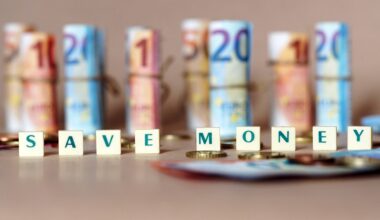The Ultimate 30-Day Financial Cleanse: Reset Habits towards money and Build a Healthier Financial Future
Getting the best out of your available money in today’s world can be difficult. Everyday the cost of living keep rising, expenses are numerous, and we are still face with different financial advice online that sometimes we get confused that we don’t even know what exactly to do.This is the gap that 30-day financial cleanse is here to solve.
Consider this guide a“reset button” to grow your finances—Just tbe same way we have health cleanse, but instead of flushing toxins from your body, this guide would help you navigate financial difficulties, help you building habits that propel your financial growth, it would also help you set a good foundation for stability in long-term.
This article is going to be a step by step summary of what a 30-day financial cleanse is, why it works, and how you can follow it. If you keep to this process, by month end, you would have not just save for yourself money but also a have practical system on how to keep track of your finance.
—
What Is a 30-Day Financial Cleanse?
A 30-day financial cleanse is a challenge that is structured to enable you take absolute control of how your money is being spent, saved, and and imbibe in you basic financial habits in just one month. In this 30 days, you would have to be committed to making intentional choices that would help reduce your expenses most especially the irrelevant ones, it would also help you organize your financial life, and spend your money only on your priorities.
This has nothing to do with you depriving yourself—it’s more about being aware of how your money leaves your pocket and bank account. The process helps you reviews your spending habit, reduce waste, with this your would have enough to put into more important projects.
—
Why a 30-Day Cleanse Works Better Than Rushing to Fixes Things.
I have seen people try one-off money challenges like “no-spend weeks” or envelope savings tricks. While these can be useful, a 30-day cleanse would do a better job because:
1. Financial awareness will be built Because you would be certain of how and where you spend even a penny of your money.
2. It help instill change in you gradually. Those little actions you take daily actions are usually more sustainable than drastic restrictions.
3. It provides structure. There is a focus for everyday,so you don’t feel confused
4. You are likely going to learn new habits from it. After 30 days, some of the behaviors have learnt must have started being part of you, thereby making it easier to keep us to those habits
—
Who Should Try a 30-Day Financial Cleanse?
This cleanse is necessary for those who are:
Struggling with saving despite earning are reasonable money.
Desire to St yourself free from paycheck-to-paycheck living.
If you are feed up with accumulating debts and expenses.
You want to start your new year in a fresh note, a new job, or maybe after a major life change.
Lastly, if you want to gain absolutely control of your finance.
—
Here is a Step-by-Step 30-Day Financial Cleanse Plan
Below is a properly structured day-by-day guide you can follow. Make sure to adapt it based on your lifestyle and personal goals.
—
Week 1: Awareness and Organization
Day 1:
Keep a well detailed account of every expense.Write down everything you spend toda.Don’t assume any amount is too small to be calculated.Make use of a notebook, spreadsheet, or budgeting app.
Day 2:
Make proper a list of all your debts, this should Include balances, interest rates, and minimum payments.Remember being fully aware of them is the first step to solving this issue.
Day 3:
Make are proper review of every subscriptions and memberships you are into cancel anyone you are sure you don’t make use of regularly. This could be streaming, apps, gym memberships.
Day 4:
Look into your bank Statements look to know if there are hidden fees, forgotten charges, or unnecessary expenses expense that you need to avoid.
Day 5:
Try to identify what is eating your money both in bulk and bit.Tqke note of those small expenses that keep recurring like daily coffee or snacks you purchase just for purchasing sake.
Day 6:
Make a proper calculate of your net worth, Do this by subtract liabilities (debts) from assets (savings, investments, valuables). Don’t panic if the result is negative, it is a necessary information if you must get back to track.
Day 7:
Now, This is where you set a financial target for yourself. For examples: To save $600 in an emergency fund, pay off one credit card, or stick to a specific budget for 90 days.
—
Week 2: Cutting Back and Saving
Day 8:
Put in place a 24-Hour rule. Before you purchase anything that is not a priority, wait 24 hours. This reduces your chances of buying our of emotions.
Day 9:
Create a calenders weekly that gives you access to little allowance. make sure the amount is reasonable and not exorbitant compare to you capacity.Once it’s finished, that is all for the week.
Day 10:
Make sure you cook all meals yourself. You would find out that a reasonable amount of money have been saved from this instead of patronizing eateries.
Day 11:
Try to put in place a No-Spend Day.
Spend only on things you can’t do without like gas or bills.
Day 12:
Look into your Utility Bill. Look for a way to refuse what you spend on energy —turn off your light when not in use, unplug every device that is not active at the moment, you can also try to negotiate with the energy providers.
Day 13:
Create an avenue whereby you automatically save
even if it’s $10 every week, with automation you could achieve consistentcy.
Day 14:
Sell at least one item that you don’t make use of. You can swell on Facebook Marketplace, eBay, or any local resale app.
—
Week 3: Building Stronger Money Habits
Day 15:
Look into your credit score. You can make use of a free credit reporting tool to check your score so as to know areas where improvement is needed.
Day 16:
Create a unique and simple budget pattern. You can make use the 50/30/20 rule: 50% needs, 30% wants, 20% savings/debt.
Day 17:
Plan your meal for the Week. Plan every groceries you would be using weekly to avoid food waste and overspending.
Day 18:
Before purchasing anything, compare prices.For larger items, take your time to look for the best but both in price and value.
Day 19:
Declutter and record Inventory. With this, you might discover that you don’t need to buy duplicates of items you already have in stock.
Day 20:
Unsubscribe from any retail emails. This would help reduce the temptation of buying things you might not need by removing ads from your DM’s.
Day 21:
Practice content for what you have. Infact write down three things you’re glade you have financially—like a good job, a supportive family, or even small wins from this cleanse journey.
—
Week 4: Long-Term Financial Health
Day 22:
Increase your savings target. If you have been saving $10 a week, increase it to $20.
Day 23:
Look Side Hustle Opportunities. Seek alternative ways to increase your income, be it freelance work, tutoring, or selling crafts.
Day 24:
Take a second look at your insurance policies.Check if there are better alternatives.
Day 25:
Edit your financial apps. Delete apps that pushes you into spending extravagantly and keep ones that help you budget your spending.
Day 26:
Set a Strategy to to pay off your debts. You can make a choice, either based highest interest first or smallest balance first.
Day 27:
Create an Emergency Fund Jar
If saving digitally is not working for you, begin a physical cash jar for emergencies.
Day 28:
Write down your mission for saving money. Example: “I want financial freedom to be able to travel, support my family, and retire comfortably.” This is what I am personally doing for myself. You won’t regret taking this step.
Day 29:
Make future plan for the Next 90 Days
You can come up with a quarterly goal—it could be saving $1,000 or even paying down $2,000 in debt.
Day 30: Run your mind through the journey so far and celebrate your wins. Take proper account of your progress, no matter how little.Celebrate your wins by doing something enjoyable for yourself but it must be within your budget.
—
Benefits You’ll Definitely Notice After 30 Days
By the end of this cleanse, This is what most people usually report:
Clearer understanding of wat they spend their money on.
They stop buying out of emotions.
They notice that they now have control over their finance. This boost confidence.
They end up getting extra savings they didn’t hope for.
After this 30 days, they are usually encouraged to keep building better financial habits because of the unexpected results they where able to attain.
—
Common Mistakes to Avoid
1.Sotop trying to get it all right. That you missed a day doesn’t imply that you have failed. Keep pushing.
2. Don’t make the process complicated. Let it remain simple, while you remain consistent.
3. Ignoring income. Yes, cutting of expenses helps, but explore ways to earn more. This could even multiply the end results.
4. Not adjusting goals. If you at some point discover that something is not realistic with the process, change it while you remain focus on the end goal instead of quitting.
—
How to Continue After the Cleanse
If you want to get the best value from the 30-day financial cleanse don’t just the habits after one month of discipline—keep us to it even after afterward. You can Keep the momentum by:
Continuous tracking of your weekly expenses.
Reviewing goals every month.
Automate your process of Savings and debt payment.
Keep repeating the cleanse at least once a year till financial freedom is attained.
—
Final Thoughts
This 30-day financial cleanse isn’t just about how you can save money —it has to do with having absolute control over your finance, instilling habits that builds confidence and help in long terms sustainability
You can look at it as a means cleaning the dirt of your financial life: it help clears unnecessary expenses and make funds available for important things. I have watched people get free from debt, save for something important all by following this guide.
Stop procrastinating mad start today, be committed to it, and I can assure that in 30 days you will look back and be glad you took this bold step twords your financial growth.
| Resource | Description | Link |
|---|---|---|
| Investopedia – Financial Cleanse | A detailed guide on how a 30-day financial cleanse can reset your money habits. | Visit Investopedia |
| NerdWallet – Budgeting Tips | Expert budgeting strategies and tools to help track and manage expenses. | Visit NerdWallet |
| Dave Ramsey – Debt Snowball Method | Learn about the popular debt snowball strategy to pay off debt faster. | Visit Dave Ramsey |
| The Balance – Emergency Fund Guide | Step-by-step instructions for building a solid emergency savings fund. | Visit The Balance |
| CNBC – Money Challenges | Insights on trending personal finance challenges and how they help with saving. | Visit CNBC |


